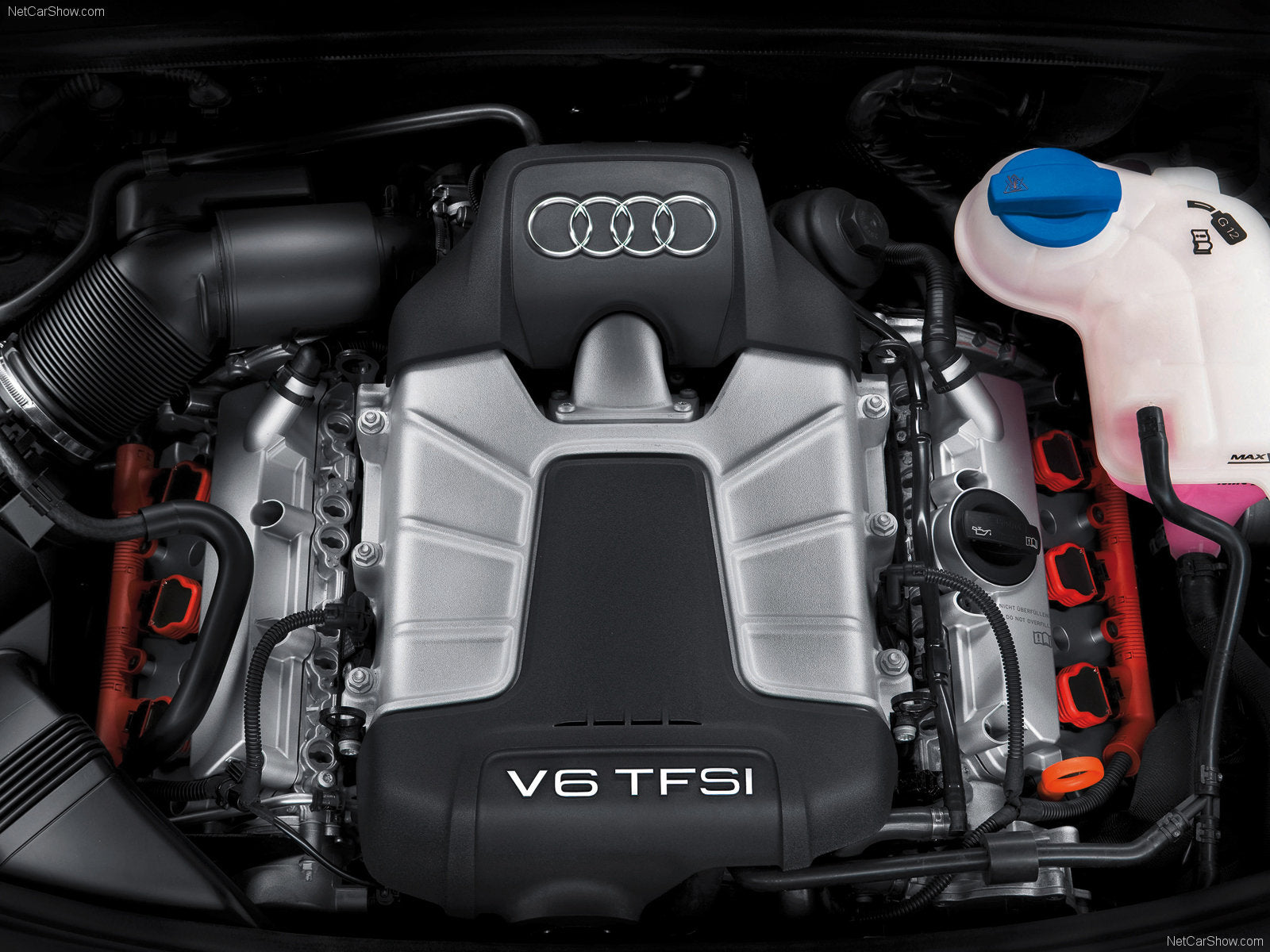
Account
Country
AUDI A8/S8/RS8
AUDI R8
AUDI Q3/SQ3
Audi Q8/SQ8


Introduced by Audi in 2009 with the B8 S4, the 3.0T engine has become a symbol of strength and innovation in the automotive world. This engine, famous for its 333 horsepower output right out of the box, is a key player in Audi's lineup, powering vehicles from the sporty B8 S5 to the luxurious A6 and A7, and extending its prowess to the bigger Q5, SQ5, and Q7 SUVs.
Each of these models benefits from Audi's top-notch quattro all-wheel-drive system, with some also being offered in a manual transmission for those who love to take full control of their drive.
Related: Quattro Explained | Torsen vs Haldex
The Audi 3.0T engine is a very reliable engine. Found on a broad range of cars from 2009-2017 Audi has learned from its mistakes and improved year over year. We will address some of the most common issues that can be found with the 3.0T engine - mainly first model years.
To answer the public, the 3.0T is a very reliable engine, makes good power and has proven to live up to expectations. Some people have reported 250k miles going strong despite some of the things that we will mention down below needing maintenance based on mileage. Here are some things for you to watch out so your 3.0T lasts as long:
The water pump is a known weak spot. Audi made significant improvements after 2011, but it's wise to stay alert. Problems usually come from the seals hardening or the pump itself breaking down, leading to coolant leaks. Catching this early can save you from bigger problems.
There was an update from Audi for the B8.5 S4,S5 and generally all models after 2013. All these models featured a newly designed water pump with better materials and it has proven to last longer. If you want to avoid water pump issues try to avoid 2010-2012 models.
Related: Audi A3 Evolution
The thermostat can go bad on the 3.0T’s and cause big troubles. It’s an easy fix for some people to do at their garage.Most commonly the thermostat gets sticky on the inside and stuck which can cause your engine to overheat or in other cases not be able to run at optimal temperatures.
The 3.0T comes with badly placed cats. This causes the catalytic converters to overheat, messing up the materials inside. They start to melt and clog up the works, like blocking the holes in a honeycomb. This creates a nasty back pressure on your engine. We have talked in detail about the solution to gutted cats here.
Related: Audi S5 Generation
All B8 S4 models have a problem with their mechatronic system. Common signs of a failing Mechatronic unit include car going in limp mode, passing gears or totally locked out gears 1,3,5,7 - which does make the driving experience pretty harsh.
The IC motor and high-pressure pump are common components for failing on the DCT DSG mechatronic unit. Pressure leaks can cause the high-pressure pump to overwork and burn out. The failure of these two components are however usually secondary issues, which are misdiagnosed as the primary suspects.
To avoid replacement of this part you should avoid the B8 S4 or anything built from 2009-2013. For those of you who like to experiment with German performance cars, there is a solution but it’s labor intensive. If the solenoids are working well there is a good chance of a clocked filter which sits inside the mechatronic unit. Replace that and you have yourself a running DSG.
This clocked filter will block out the passage of oil and some people consider this to be the flaw in most B8 S4’s.
Related: Best Audi's To Mod
The PCV valve is crucial for controlling engine pressure and keeping things running efficiently. Failure is common around 60,000-80,000 miles and can be tricky to spot, but it's vital for engine performance and emission control. This part is a little more tricky to get into as it requires removal of the supercharger and it’s not a 1 person job.
There is no model year that doesn’t lack this issue as it's pretty common for a lot of supercharged cars and a lot of the VW/Audi group cars having a faulty PCV valve. At a certain mileage the PCV valve will fail. It's best recommended to replace it before it breaks down to avoid any bigger damages. Common issues with a PCV valve include car misfiring a lot, not having the supercharger punch and sometimes not exceeding 4k rpm.
There are 2 ways the PCV Valve can go bad on the Audi 3.0T engines. One is on the air side, meaning you have a lot of air, so if you have a loud whistle the seal on the air side is loose or broken. This often times gives you a check engine light for a fuel-air mixture type error.
The other way the PCV Valve can go bad on Audi 3.0T is coolant mixing. If any of the holes where the oil flows has a micro crack the PCV will get filled with oil. Especially for the 2010-2012 models the PCV is made of plastic and when it deteriorates it can crack, seals will harden and it will generally fail at one point in time.
Another common issue with the Audi 3.0T exhaust system is the failure of the flex pipes, especially as these cars get older or see performance upgrades. Flex pipes are built into the downpipes and are designed to absorb vibrations and movement between the engine and the rest of the exhaust. Over time, especially with tuned engines or hard driving, these flex sections can start to crack or split.
Symptoms of a failing flex pipe include a noticeable exhaust leak (a ticking or hissing sound), reduced performance, or even a smell of exhaust gases in the cabin. You might also see visible damage or fraying if you look under the car. If left unchecked, a broken flex pipe can cause more serious exhaust leaks and may lead to a failed emissions test.
On the 3.0T, the stock flex pipes are known weak points. They often fail earlier on tuned vehicles because the extra heat and movement put more strain on the original materials. Upgrading to reinforced aftermarket downpipes with high-quality flex sections is the best solution. These offer improved durability and help prevent leaks and power loss.
Keeping an eye out for these symptoms and replacing weak or worn flex pipes before they fail will help your Audi 3.0T stay reliable and perform at its best.
Related: The Ultimate Audi 3.0T Downpipes Guide
Yes. The 3.0T is widely considered one of Audi’s most reliable engines. Owners regularly report high mileage with only routine maintenance. Early models (2009–2012) can have a few more issues, but most are well understood and preventable.
Look for coolant leaks under the car, rising engine temperature, or a “low coolant” warning. If you own a 2010–2012 model, keep an eye out, as these pumps are more likely to fail.
Symptoms include slow engine warm-up, fluctuating temperatures, or overheating. A sticky thermostat is a known weak point and should be replaced promptly to avoid engine damage.
The main cause is their placement close to the engine, which exposes them to excessive heat. Over time, this breaks down the internal structure, causing blockages, loss of power, and potential check engine lights.
Common issues include the car going into limp mode, rough gear shifts, or certain gears (like 1, 3, 5, 7) not engaging. The mechatronic unit is a complex part, and failures are most common in early B8 S4 models.
A failing PCV valve can cause engine misfires, loss of power, check engine lights, and sometimes a whistle from the engine bay. It can also result in oil leaks or high oil consumption.
Watch for ticking or hissing exhaust sounds, loss of performance, or a strong exhaust smell inside the car. Visual checks underneath may reveal cracks, fraying, or exhaust leaks at the flex section.
Yes. Regular maintenance and early replacement of known weak parts (like the water pump, thermostat, and PCV valve) can keep your 3.0T running reliably for many years. Upgrading to higher-quality aftermarket parts for downpipes and flex pipes is a smart long-term move.
Some, like the thermostat or water pump, can be tackled by experienced DIYers. Others, like the PCV valve or flex pipe replacement, are best left to a trusted shop due to their location and the labor required.